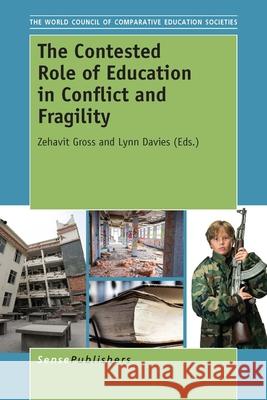The Contested Role of Education in Conflict and Fragility » książka
The Contested Role of Education in Conflict and Fragility
ISBN-13: 9789463000086 / Angielski / Miękka / 2015 / 274 str.
The Contested Role of Education in Conflict and Fragility
ISBN-13: 9789463000086 / Angielski / Miękka / 2015 / 274 str.
(netto: 235,83 VAT: 5%)
Najniższa cena z 30 dni: 236,46
ok. 22 dni roboczych.
Darmowa dostawa!
This book brings together new thinking on education's complex and evolving role in conflict and fragility. The changing nature of conflict, from inter- to intra-state, and with shifting geopolitical power balances, demands a reconceptualization of where education is positioned. Claims that education on its own can be an agent of conflict transformation are disputed. Deliberate attempts at peace education are not without critics and controversies. This collection aims to generate new realism from empirical and reflective accounts in a variety of countries and political contexts, as well as provide innovative methodological approaches to the study of education and conflict. The particular distinctiveness of the volume is the emphasis on 'contested' - it includes the debates and disagreements on the many faces of education in conflict, as well as material on teaching controversial issues in fragile contexts. Crucially, it underscores how education itself exists within highly contested projects of state, nation and region building. As well as overview comparative chapters, the collection encompasses a range of specific contexts, geographically and educationally - Algeria, Canada, El Salvador, Israel, Kenya, Mexico, Morocco, Nepal, Tunisia, UK and US, with settings that include schools, higher education and refugee camps. Focuses range from analyses of education in historical conflicts to contemporary issues such as post Arab Spring transformations. Perennial concerns about religion, colonialism, protest, integration, cohesion, emergencies, globalization and narrative are given new slants. Yet in spite of the debates, a cross-cutting consensus emerges as the crucial need for critical pedagogy and critical theory if education is to make any mark at all on conflict and fragility.
This book brings together new thinking on educations complex and evolving role in conflict and fragility. The changing nature of conflict, from inter- to intra-state, and with shifting geopolitical power balances, demands a reconceptualization of where education is positioned. Claims that education on its own can be an agent of conflict transformation are disputed. Deliberate attempts at peace education are not without critics and controversies. This collection aims to generate new realism from empirical and reflective accounts in a variety of countries and political contexts, as well as provide innovative methodological approaches to the study of education and conflict. The particular distinctiveness of the volume is the emphasis on contested - it includes the debates and disagreements on the many faces of education in conflict, as well as material on teaching controversial issues in fragile contexts. Crucially, it underscores how education itself exists within highly contested projects of state, nation and region building. As well as overview comparative chapters, the collection encompasses a range of specific contexts, geographically and educationally - Algeria, Canada, El Salvador, Israel, Kenya, Mexico, Morocco, Nepal, Tunisia, UK and US, with settings that include schools, higher education and refugee camps. Focuses range from analyses of education in historical conflicts to contemporary issues such as post Arab Spring transformations. Perennial concerns about religion, colonialism, protest, integration, cohesion, emergencies, globalization and narrative are given new slants. Yet in spite of the debates, a cross-cutting consensus emerges as the crucial need for critical pedagogy and critical theory if education is to make any mark at all on conflict and fragility.











